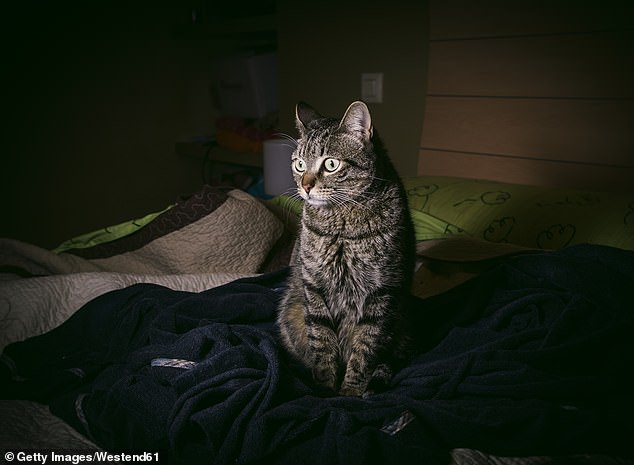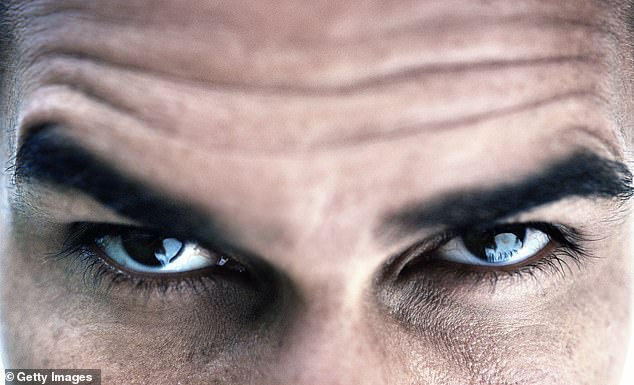Honey is deaf. She’s a liver-and-white Brittany spaniel, a breed originally used for hunting, and she has an intriguing ability: Honey can be fast asleep and yet she knows when a human is staring at her.
‘If someone is looking at her, she will wake up, even if she is in a dream or deep sleep,’ her owner told me.
To anyone who is curious about how the mind works, this is fascinating. Honey can’t be reacting to an audio cue, such as a voice or a footstep, because she’s completely deaf. And, of course, she’s asleep, so she can’t see movement.
Her owner assures me this is not a sporadic ability. The dog almost always wakes up when people look at her. This has been tested far too many times for it to be mere coincidence.
Here’s the truly extraordinary thing: Honey isn’t unusual. Many owners report the same phenomenon with their pets and even farm animals.
So do a significant number of parents, who say their children will wake up if they sense they are being watched.
In my research over the past 25 years, I have also collected accounts of adults who can wake sleeping lovers or spouses . . . and a few who complain that their partners wake them up by watching them.
In fact, I have compiled more than 240 cases from the UK, Europe, Canada and the US that suggest sleeping humans and animals are frequently aware of when they are being watched. Evidence suggests they can even be aware of where the watcher is – above, behind or to the side.

Don’t believe it? Here are just a few of the reports I have collated and published in the latest edition of the peer-reviewed Journal of Scientific Exploration. Read these, and make up your own mind:
- I can look at my cat from a distance, careful not to make any movement or noise which could alert him to what I’m doing, and with hand on my heart, I can say he truly knows I’m thinking about him. His eyelids will gradually open to reveal beautiful green eyes, which will look sleepily in my direction before he groans, then snuggles down again.
- I have had dogs for years, and I can state unequivocally that they will often awaken if you stare at them, but it’s most likely to occur if you are thinking about them, less likely if you happen to be looking at them, but are thinking of something else. I can also wake up my cat when she is sound asleep if I look at her. I have done it many times.
- I can wake my poodle by staring, unless she is deeply asleep and dreaming. I’ve been careful not to do anything but raise my eyes. If I’ve been reading, for example, and look directly at her, her eyes open within 30 seconds and she focuses on me.
- I find that, whenever I look at my dogs, they will lift their heads from sleep to look back at me and perhaps wag their tails. Not that I was intentionally trying to wake them, but as though they have a ‘sense’ of the fact that my eyes were trained on them.
- My dog sleeps in his bed, which is beside mine, and if I am awake in the night (which is quite often as I don’t sleep particularly well) I sometimes look at him while he is sleeping. However, in doing this I seem to wake him up. He will suddenly open his eyes and turn his head to look straight at me. I just pat him, and he will then settle back down and go to sleep.
A significant number of people report that staring is most effective when they think loving thoughts or silently imagine saying the pet’s name:
- As my cat was lying fast asleep on the carpet, I decided to try to wake him by staring. At first, nothing much happened, though I noticed that each time I stared at him and mentally said his name, his tail would twitch and start waving about. When I looked away and continued working on the computer, I saw – from the corner of my eye – that his tail would stop. After three tries of him lashing his tail without opening his eyes, I left him in peace for about five minutes. Then I turned my attention on him again, mentally thinking his name. The result was amazing. His whole body jerked awake and he turned his head and looked straight into my eyes accusingly, as if I’d physically shaken him awake.

Even farmyard animals appear to have this ability. This is a report from a woman who farms in Britain: ‘I had a tiny piglet I was hand rearing. She slept in a tea chest by the cooker. I passed by it constantly going to the kitchen and bathroom, and as long as I didn’t look in, she would stay asleep but every time if I looked in the box as I passed, she would grunt, and immediately be wide awake looking up at me. I have had the same experience with hand-raised orphan lambs, but they’re not so quick and lively as the piglet. I have also had pigs in their pens wake as soon as I pause and look at them.’
This is a report from a woman who farms in Britain: ‘I had a tiny piglet I was hand rearing. She slept in a tea chest by the cooker. I passed by it constantly going to the kitchen and bathroom, and as long as I didn’t look in, she would stay asleep but every time if I looked in the box as I passed, she would grunt, and immediately be wide awake looking up at me. I have had the same experience with hand-raised orphan lambs, but they’re not so quick and lively as the piglet. I have also had pigs in their pens wake as soon as I pause and look at them.’
This echoes my own findings. In 1996 some students and I carried out a filmed experiment at a park in Rome – on geese. Five researchers hid in bushes with binoculars, to observe the birds resting on the edge of a lake.
They repeatedly stared at the geese and, on ten occasions, the birds woke up. Over a similar timespan, they ignored the geese – and the birds woke up only three times.
Does the phenomenon work in both directions – that is, if animals can sense us watching them, can we also feel them looking at us when we’re asleep? These cases suggest we can:
- When the cats want to come in at night, they sit on the windowsill right outside my bed and they must simply sit there and stare at me. Without fail, I wake up in the middle of the night, look at the window, get up and let them in. My kids say a bomb could go off and I wouldn’t wake up. But I wake up without fail for my cats.
- I had a cat who could wake me up in the middle of the night for food just by sitting in the doorway and staring at me. There were two strange things about this. The first is that I’m the kind of person who could sleep through Armageddon; the second is that when I woke up, I’d be staring straight at him.
But perhaps the most interesting question is this: can one human wake another, by silently staring? My research suggests it’s entirely possible, but less common.
- A woman in Germany wrote: ‘My husband and I sometimes play the game of gazing at the other who is sleeping until he or she wakes up. We call this wachgucken, which means literally “to stare someone awake”.’
- Another woman told me: ‘My husband spent the first year of our relationship waking me in the middle of the night by watching me. His stare pulled me right out of a sound sleep several times. It was like a magnetic pulling sensation that brought me to consciousness.’

But it is children who most often seem sensitive to being watched:
- When my sister and I were small, still going to primary school and sharing a room, I came to realise that when she was sleeping, all I needed to do to wake her was to look at her. This would happen almost invariably, so when I didn’t want to wake her when leaving or entering the room I strictly avoided looking at her.
- When I was a child, I would often wake up to my mother’s face in my bedroom doorway. One day I asked her how she woke me in the morning to get ready for school because I had never heard her say anything to me, or touch me, or even come near me. She replied that she just stopped at my door and looked at me and I would wake up.
- My mother tells me that when I was little, probably around three years old, I used to come into her bedroom and stare at her when she was asleep. She would wake up and I would be standing there, just staring at her. I didn’t make a sound and don’t know how long I was there before she woke up.
One respondent even attempted an experiment with strangers on the Tube.
I wouldn’t recommend this, though the results were intriguing: ‘When travelling on the subway, I look at sleeping people. When I look at them with love, they wake up smiling and know instantly I’m the one staring at them. Then sometimes I look with hate, and they look up directly at me with fear in their face.’
An interesting aspect is how the sleeping strangers appear to sense exactly where the stare is coming from. They don’t wake up and look around, trying to work out what woke them – they open their eyes and immediately return the gaze.
This echoes my other research into how people can sense when someone is watching them from behind or above, out of their ordinary sightline.
Those who watch people for a living, such as private detectives and celebrity photographers, often corroborate this.
Professionals who use long-range lenses, including paparazzi and snipers, know the moment when the target reacts to their gaze and looks straight at them.
My working hypothesis is that this has something to do with the weak electromagnetic field that surrounds each of us. Our bodies, especially our brains, generate electricity, and that creates a magnetic field which – if my theory is correct – registers a disturbance when people look at us.
Looked at from an evolutionary standpoint, this makes perfect sense. Prey animals are more likely to survive if they are aware when a predator is watching them … and humans can be predators as well as prey.
I’d love to hear from readers who have experienced this themselves, especially with sleeping animals.
If you’d like to try a scientific experiment, set up the video on a mobile phone or tablet to film a pet while it sleeps. Ignore it for a while, then turn your gaze on to it. Don’t make any sound or other movement, but stare hard. If the pet doesn’t wake immediately, try thinking its name without saying it aloud. Make a note of any observations.
And I’d especially like to hear from laboratory researchers with mice or rats, who would be willing to try an experiment.
Ideally, we could set up a one-way mirror, similar to the ones used in police interview rooms, and watch the rodents while they were completely unaware of our presence – unable even to smell us.
Could we wake a sleeping mouse by staring at it through glass? I’d like to find out. And here’s the twist that makes the experiment irresistible: how would the mice react to being watched through the mirror by a cat? Would it make a difference? Would they be more sensitive to a staring feline?
Cats are the natural predators of mice, after all. A positive finding would suggest strongly that the ability to know when we’re being watched, even when we are asleep, is an evolutionary superpower.
- Contact me at sheldrake@ sheldrake.org. Full details of the research are published in my paper in the Journal of Scientific Exploration, available on my website: sheldrake.org.

